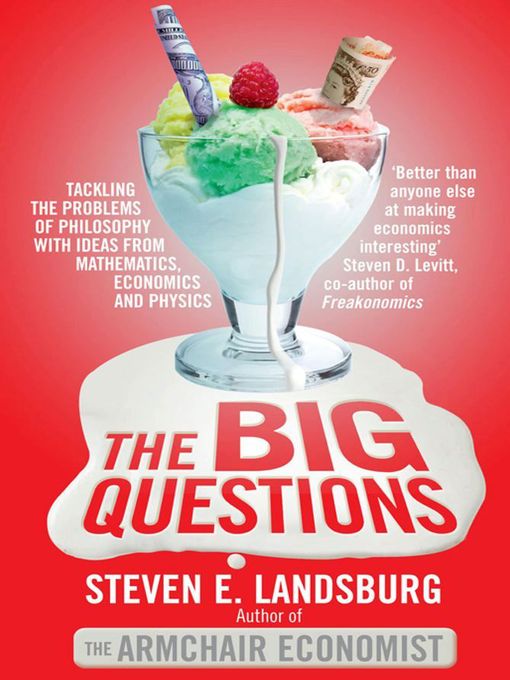by Viva Avasthi
Rating out of 5: ★★★

Rating out of 5: ★★★

I don’t know how many of the readers of this blog are familiar with the writings of Steven E. Landsburg, a professor of economics at the University of Rochester in Rochester, New York. For me, this was the first time I’d read any of his books despite the fact that another of his books, entitled ‘The Armchair Economist’, is far more popular.
The book has been written to fulfil the purpose of “tackling the problems of philosophy with ideas from mathematics, economics and physics”, which sounds brilliant, but it’s arguable as to whether the author actually manages to achieve this purpose as well as could be expected from a best-selling author.
In his introduction to the book, Landsburg writes:
“In this book, I’ll tell you what I believe about the nature of reality, the basis of knowledge, and the foundations of ethics. I’m not sure any of my beliefs are right, but I’ll explain why I think they’re plausible – and more likely to be right than any other beliefs. (Though of course I might eventually be convinced otherwise by new arguments.)”
That extract manages, in fact, to provide a brilliant reflection of the nature of this book. It’s mainly a collection of fairly random ideas discussed from a slightly biased outlook, but which does provide an entertaining and thought-provoking read. Some aspects of Landsburg’s logic seem sound, if a little too quickly explained, but others don’t make too much sense at all and left me questioning how the author could have such a solid opinion on the correctness of something when it seemed completely wrong to me.
For example, at one point, Landsburg writes about his opinions on The Headache Problem, which is a scenario posed by a distinguished philosopher (whom Landsburg doesn’t mention by name). The scenario is as follows:
“A billion people are experiencing fairly minor headaches, which will continue for another hour unless an innocent person is killed, in which case they will cease immediately. Is it okay to kill that person?”
Take a moment to think about how you would answer that question.
Landsburg doesn't hesitate to state that he can’t “actually understand why this was a dilemma; the answer is yes, for reasons that would be immediately obvious to any economist.”
Although I haven’t formally started learning economics yet and so don’t know if there’s some sort of logic that all economists must follow which is “obvious to any economist”, the idea that a person should be killed to cure the “fairly minor” headaches of a billion people which will last only for “another hour” seems completely absurd! How can it be justified to kill a person to cure the minor discomforts of a billion others? Granted, a billion people overpower just one person if we look at this from the utilitarian view, but it’s not like a minor headache lasting for a short period of time would bring the global economy to a standstill (which might just justify sacrificing one person).
Landsburg proceeds to justify this opinion by writing that people will pay one dollar to buy medicine to relieve their headache, but not to insure themselves against a one-in-a-billion chance of death. Therefore, he claims, “[…]if I can replace your headache with a one-in-a-billion chance of death, I’ve done you a favour. And I can do precisely this by killing a headache sufferer at random[…]People have died so that other people can drive to the opera. Why shouldn’t they die to cure other peoples’ headaches?”
It’s all pretty interesting and highly debatable stuff. I’m sure some of you will have opinions one way and some the other. You might actually know why supposedly any economist would say “yes” to killing that random person! If you do, why not write your own article on the matter to provide the people who have read this book and will read it in the near future with a better answer than the one Landsburg provides.
All in all, despite its shortcomings, I would highly recommend this book to anyone who enjoys a good argument. The last chapter on “What to Study” provides a narrative of how the young Frank Plumpton Ramsey “[made] the most of his youth” to “let [his] mind run free”. It is particularly inspirational and definitely worth a look for those of you who haven’t yet decided which university degree to pursue.

Good review. I wonder whether Landsburg's answer to the headache question would change if we added the clause "starting with Steven Landsburg and then working through his list of friends & family". Hopefully, at some point in the process, he would have to face the loss of somebody he loves, even if he cares little for himself. As long as it only applies to a random innocent, he's looking at a 7-billion-to-1 chance and thinking it's worth a gamble. He might not be so keen to murder for mild convenience if he were forced to live by his own rules. And there we see the core of why economists have made such a mess of the world -- their money insulates them from the consequences of their actions. All religions include the idea "don't do to others what you don't want done to you" (as well as its inverse) because the wisdom of it has stood the test of time.
ReplyDelete